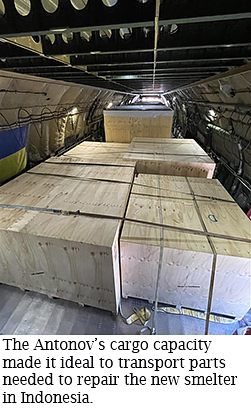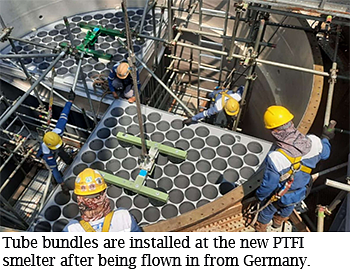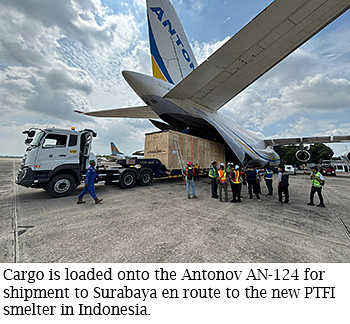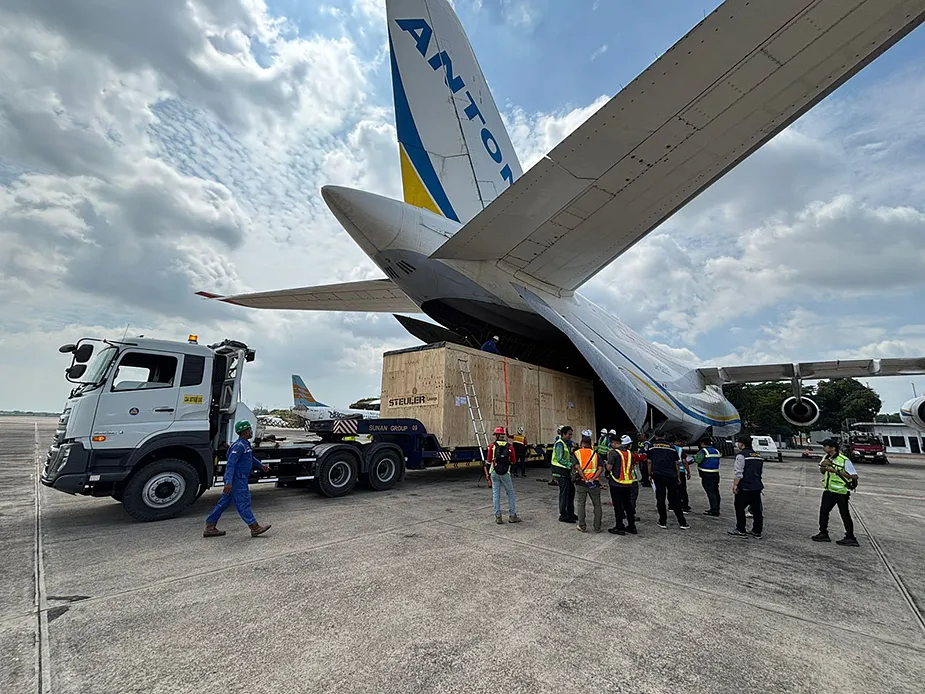One of the world’s biggest cargo planes has been deployed multiple times recently to quickly transport equipment needed to fast-track repairs on the new PT Freeport Indonesia smelter in Gresik, East Java after an October fire.
 The Antonov AN-124 was used on three flights to bring in wet precipitator internals – large bundles of tubing – and metal expansion joints produced in Germany. The company also used 747 cargo planes on five occasions to transport tools and repair parts for the smelter’s Common Gas Cleaning Plant.
The Antonov AN-124 was used on three flights to bring in wet precipitator internals – large bundles of tubing – and metal expansion joints produced in Germany. The company also used 747 cargo planes on five occasions to transport tools and repair parts for the smelter’s Common Gas Cleaning Plant.
That cut the transport time to about 35 hours rather than the 40 to 60 days it would have taken had the components been sent by ship. The equipment was flown to Surabaya and driven on trucks to the smelter site about three hours away.
"We are making every possible effort to ensure this recovery process runs effectively and efficiently so that the smelter can resume production as quickly as possible,” said Tony Wenas, President Director-PTFI.
The tube bundles are produced near Frankfurt, Germany, and were needed in a short time frame to keep repairs in Indonesia on schedule. Given the urgency, flying them from Germany to Surabaya rather than putting them on a ship and risking weeks of delays made logistical sense, Wenas said.
 The Antonov was chosen because it was the only available cargo plane big enough to handle the bundles since they are too large to fit into more conventional air transports, such as the 747s used for smaller materials.
The Antonov was chosen because it was the only available cargo plane big enough to handle the bundles since they are too large to fit into more conventional air transports, such as the 747s used for smaller materials.
A dozen of the massive tube bundles needed to be shipped from Germany to Indonesia. Even the Antonov could handle only four at a time, requiring three separate flights, said Bruce Nickle, Director, Global Supply Chain Logistics and Transportation. There were two deliveries in February, and the final shipment was sent March 2.
In addition to the Antonov, PTFI used conventional 747 cargo jets for five shipments of smaller goods.
 Shortly after the fire at the clean gas separation facility in October, it was determined additional tools and equipment would be needed to assess the damage and begin initial repairs. Much of that equipment was scattered across the United States, so it was sent to Houston where it was packaged for shipment, loaded onto a 747 and flown to Surabaya late last year.
Shortly after the fire at the clean gas separation facility in October, it was determined additional tools and equipment would be needed to assess the damage and begin initial repairs. Much of that equipment was scattered across the United States, so it was sent to Houston where it was packaged for shipment, loaded onto a 747 and flown to Surabaya late last year.
There have been four flights since: three from Turkey to deliver steel parts and one from Belgium carrying insulation. Another 747 flight with components for the smelter damper is planned for later in March.
Material and equipment not needed immediately, too hazardous, or too large even for the Antonov are loaded on ships for ocean transport, which costs far less than air transport, Nickle said.
“We have a global network of transportation professionals that coordinate directly with each other, sites and project teams to get material where and when needed,” Nickle said. “We are always looking to meet the company’s needs at the best value.”
